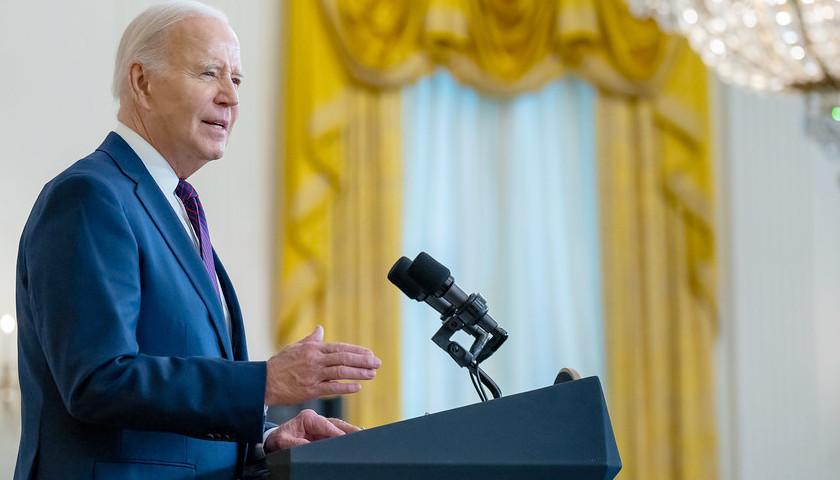by Sean Trende
We’ve paid much attention to President Biden’s flagging job approval here, in part because it tends to be a strong predictor of how an election will turn out. Biden is marching into this election season as likely the least popular president to face the voters since Herbert Hoover. While he may yet be saved by the fact that he is facing off against Donald Trump, who brings his own baggage to the table, it’s an ominous indicator.
At the same time, the economy is running hot. Growth is over 3%, unemployment is under 4%, and inflation has fallen from its peak. So why the seeming paradox of an unpopular president in a time of strong economic growth, especially when the strength of the economy is itself a traditional predictor of presidential job approval?
There are two reasons. First, we ought not fall into the trap that many commentators – especially political scientists – fall into of economic reductionism. Yes, it is “the economy stupid,” as the iconic sign hanging inside Bill Clinton’s campaign headquarters famously reminded his staff in 1992. Less well-remembered, however, the sign also listed “Change vs. more of the same” as the first principle of the campaign, with “Don’t forget healthcare” as an additional item.
So people do care about the economy, but they also care about things ranging from the war raging in the Middle East to their overall perception of the president. This is where Joe Biden’s age likely matters. And the more he shows it, the more it matters.
More importantly, commentators misunderstand the nature of inflation. Recessions are routine, and national economies often come out of them stronger than they entered them. Inflation, on the other hand, topples governments. Most recently, it was the impetus for the “Arab Spring” of 2010-2012. There are a few reasons inflation is different.
First, inflation is never “transitory.” Even after it is over, price levels rarely fall appreciably (indeed, deflation has its own problems). Consumers don’t automatically reset their baseline. So even if prices are level (and there is still inflation in the U.S.; it is just the rate that has slowed), people are still surprised when they pay $2 per pound for chicken, comparing it to when chicken was $1.44 for a pound in 2021.
Second, inflation is constantly in our face. Every time a consumer goes to the store and makes a purchase, they’re reminded of the impact. This is true for gasoline, food, clothing – every commodity an individual consumes. That’s not to say other indicators don’t hurt; it’s just to say they are not felt as often.
It isn’t just goods and services either. The main tool the Fed has to fight inflation – raising interest rates – has secondary and tertiary consequences. We refinanced our home in the late teens for an extremely low interest rate. We recently considered moving to a somewhat bigger home that had some updates. But because of the higher interest rate (and a few other factors), it simply made no economic sense to consider this. I understand that this is definitely a “First World problem,” and there are far worse fates than staying in a comfortable house. But for a society accustomed to using their houses as ATMs when interest rates were low, it’s an unsettling change. For people who want to get into the housing market for the first time, it’s an even bigger problem.
Finally, and most insidiously, inflation affects everyone. Consider unemployment. Even at the height of the Great Recession, unemployment barely crossed the 10% threshold. That meant that 90% of the populace was employed. Yes, there are nasty effects such as depressed wages and anxieties about layoffs that come with recessions, but the main impact is on a small portion of the population.
Inflation hits you no matter what you’re purchasing. If your idea of a night out is dinner at McDonald’s, your extra value meals cost more. If your idea of a night out is Outback Steakhouse, prices were up by 5% in 2022 alone (though the beloved franchise has vowed to rein in price increases moving forward.) As for fine dining, my wife and I celebrated a special occasion at a fancy steakhouse in Ohio recently and shelled out around $80 per steak.
No one need feel sorry for us and our nice steak, but the salient issue is that no matter what your price point, you feel the pinch. It’s true that wages have nearly kept up with inflation (on average), but that’s cold comfort for an individual who finally gets a decent raise, only to see it go to cover inflated prices.
Of course, expectations will reset eventually as memories fade; this isn’t forever. But President Biden only has nine months until Election Day. These lingering effects are probably what drive the disjunction between his job approval and the economy, and it’s not really within his control to adjust how quickly those expectations reset.
– – –
Sean Trende is senior elections analyst for RealClearPolitics. He is a co-author of the 2014 Almanac of American Politics and author of The Lost Majority. He can be reached at [email protected]. Follow him on Twitter @SeanTrende.





